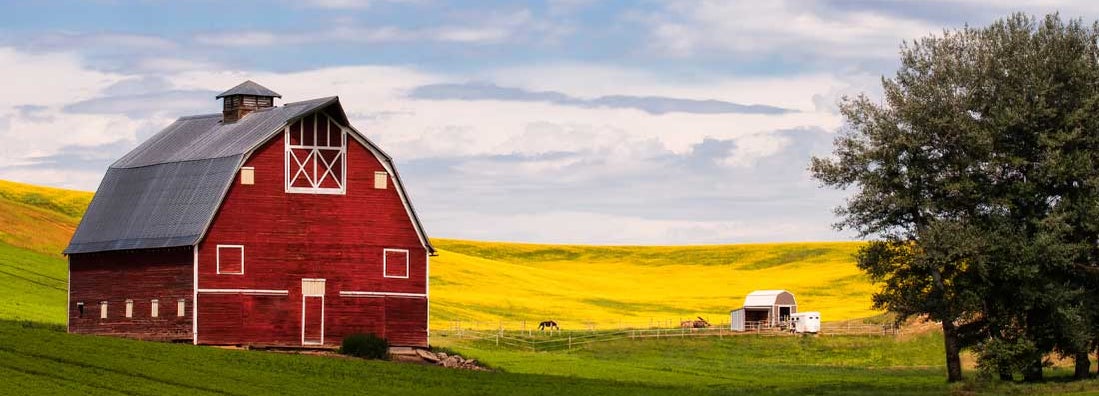Livestock & Cattle Insurance
(What to do About High Livestock Mortality Rates)

Raising livestock and poultry to sell can be unpredictable and risky. That's why a solid and affordable livestock or poultry insurance policy is a necessity. This insurance protects your investment from those unexpected events and accidents that can decimate your animals and your livelihood.
Farm animal insurance can be customized to cover your specialized animal group, whether you have cattle, pigs, sheep, emu, goats, chickens or any combination of these on your farm.
Our independent agent matching tool will find you the best insurance solution in your area. Tell us what you're looking for and we'll recommend the best agents for you. Any information you provide will only be sent to the agent you pick.
Causes of Cattle Mortality
- 24% die of respiratory problems
- 13% die of digestive problems
- 12% die of weather events
- 12% die as a result of calving
The Basics of Livestock Insurance
Cattle and other livestock face mortality risks caused by accidents, sickness and disease. There are blanket coverages that apply to most livestock and poultry, and specialty coverages for specific groups of farm animals, such as cattle, sheep, goats, pigs, hogs, chickens, and emus.
The starting point for your operation will likely be farm or farm operations coverage and a limited animal mortality policy. Normally, these can be combined into a farm package that will protect your facilities, structures and your livestock or poultry in the event of death caused by accident or injury.
Some insurers may include a more comprehensive animal mortality policy that includes sickness and disease or policy options for a specialized type of animal. There are three ways to cover your animals:
- Individual coverage: This insurance usually covers higher-value animals on an individual basis. The animals are listed on the policy according to some identifying marker or description, such as an ear tag, and covered for a specific dollar amount.
- Blanket coverage: This type of policy allows you to insure all your farm property for a predetermined value. It includes structures, equipment, tools and livestock.
- Herd Coverage: This is the simplest and most prevalent type of insurance for livestock. This coverage allows you to insure a specific number of animals, for example, 200 diary cattle or 500 pigs.
Your per-head cost will be determined by the coverage you choose. Obviously, the per-head price for an individual policy will be more than the per-head cost of the blanket or herd policy. Keep in mind that some farm policies may cover certain broad perils, but exclude sickness and disease. Make sure you understand the details of your coverage.
These policies cover a broad range of death causes and may be divided into two kinds of coverage:
- Comprehensive Coverage: A broad peril coverage that includes accidents, sickness, disease and injury; normally includes theft
- Limited Coverage: Covers a specific list of incidents, such as:
- Accidents: Drowning, shooting, loading and unloading, falling objects, fire, smoke, electrocution, explosions
- Weather events: Flooding, lightening, wind, hail
- Natural disasters: Earthquakes, volcanic eruption, sinkholes
- Crimes and civil unrest: Theft, vandalism
- Systems breakdowns: Water, heating
- Animal attacks
- Collision or other death while transporting
Cattle Insurance Basics
Cattle mortality insurance is animal mortality insurance that specifically covers your cattle. You may want to consider additional coverages for your cattle operations during the feeding and growing stage.
Whether you have dairy cows or raise cattle on feedlots or pastures, you can get optional coverages that fit your needs. Here is a sampling:
- Valuation options: Standard polices will use current market valuation, but some companies will allow you to amend a policy and agree on more flexible values.
- Hypothermia, contaminated feed and water and other special causes: Some companies offer policies for specialized situations not included in the broad perils of a regular policy. These special coverages may only apply to certain states and may only apply to dairy and feedlot cattle, not pasture cattle.
- Dead body removal: Some policies will add an option of removing the animal carcass if it dies in a covered loss.
Protect Your Hogs with Pig Insurance
As with cattle insurance, most companies offer amendments to a standard policy that is relevant to your pig operation. Many insurance companies that provide livestock insurance will cover swine raised in a restricted area.
These packages cover specific causes of death only. For example, you may choose protections for barn fires, specific weather events, accidental drownings, falling objects, and so on. Some options might include:
- Death due to mechanical breakdown or power interruption
- Death by contaminated feed
- Reduced value for swine unable to reproduce
- Payment of contract penalties caused by loss of swine
Sheep and Goat Insurance
Your sheep and goats are usually covered as part of your farm package. Farm insurance covers your facilities and structures, as well as your sheep and goats.
Normally, a general farm or agribusiness policy will not cover death by sickness or disease, but will cover accidents, weather events, death while transporting and things of that nature. If you have high-valued sheep or goats that you want to insure individually, you should consider a specialized animal mortality policy.
An independent agent can find you specialized animal mortality coverage, if it is available in your state, for your specific sheep farming needs. Your agent can help finding sheep insurance that will give you peace of mind.
Chicken Insurance and Other Coverage for Poultry
Poultry insurance policies are customized to protect you from the risks that your poultry operation faces. Whether you raise chickens, turkeys or even emus, there is an insurance option that can protect your investment.
Most policies are designed for direct physical damage caused by a broad range of perils. Your insurance can be amended with applicable options if necessary.
The standard policy may also compensate you for removal of carcasses and transporting poultry by contracted carriers, for example. Sickness and disease are not covered under these policies. Here are some of the add-ons you can choose from:
- Power interruption or mechanical breakdown that causes the death of the covered poultry
- Loss of income due to interruption of egg production by covered incident
- Loss of income due to loss of meat birds by covered incident
Setting Up Sound and Affordable Coverage
If you've invested time, money and resources into your animals, or if your livestock is your livelihood, make sure you have sound and affordable farm animal insurance.
Use our independent agent matching system to find the best insurance plan in your area. You tell us what you’re looking for, and our technology will recommend the best agents for your needs. Any information you give us will only be sent to the agents you pick.
